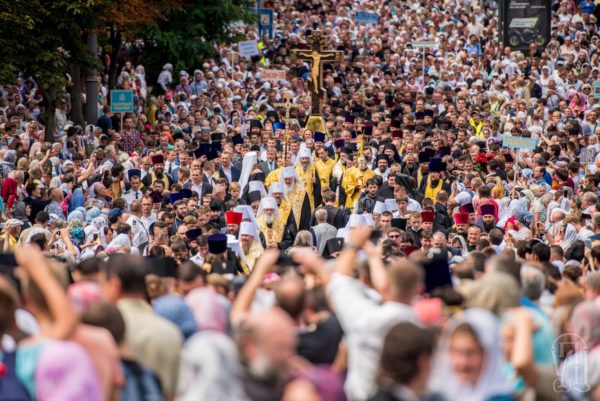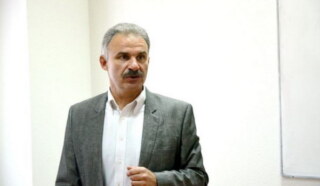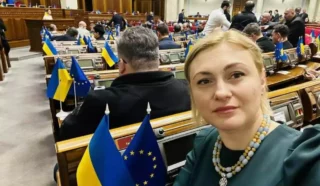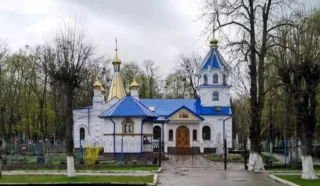STATEMENT
By Representation of the UOC to European International Organizations on certain issues related to the situation of the Ukrainian Orthodox Church in the context of international law and OSCE standards
Representation of the Ukrainian Orthodox Church to European International Organizations, responding to the ongoing violations of the rights of Orthodox Christians in Ukraine, viz. continuing church raiding, serious criminal offences against believers of the Ukrainian Orthodox Church (hereinafter – UOC), blocking registration of statutes and restricting civil rights of religious organizations of the UOC by the law on forced renaming, dissemination of hate speech in the media against clergy and laity of the UOC, draws the attention of the international community and deems it necessary to clarify some positions of the UOC on the issues discussed at the international-legal and national levels:
The Holy Synod of the UOC[1] and the Council of Bishops of the UOC[2] have repeatedly voiced their concern regarding the facts of violations of the UOC believers’ rights, as well as a discriminatory policy pursued by the authorities at various levels. At the same time, a number of State actors, religious leaders, as well as the media[3] continue to promote a thesis that the UOC communities change their canonical jurisdiction voluntarily. Giving an assessment to these false claims, it has to be noted that nearly 500[4] churches of our confession have been seized or illegally re-registered since 2015. During the seizures of the temples, for example, in Zadubrivka[5], Katerynivka[6], Ptycha[7], lots of grave crimes were committed, which inflicted damage on the UOC believers. Furthermore, the number of public testimonies[8] and appeals of believers on such grievous offenses is so numerous that the fact of en masse human rights violations associated with church raiding does not require any special inquiry. As for determining the righteousness of either side of a particular conflict, the church raiding scheme applied to UOC temples and currently implemented in Ukraine occurs both via direct seizure without any supporting documentation and through illegal re-registration of the community in favor of “Orthodox Church of Ukraine”[9] (hereinafter referred to as the “OCU”) by virtue of regional state administrations’ orders.
In the latter case, registration actions are carried out based on a decision of persons who are not part of the governing bodies of a re-registered community, but who are either residents of a territorial community or outsiders[10]. The documentary forgery under this scheme foresees the submission to the state body of the minutes of a parish assembly meeting on the transfer of the community to another confession, signed by persons who in fact have no legal right to sign anything. This false protocol, regrettably, is adopted by the regional state administration for implementation (re-registration) without a proper insight and without taking into account the rights and interests of the actual UOC community, which further leads to confrontations around the church. In this situation, the believers of the UOC, who actually lose control over the legal entity, have to prove in court a personal composition of the members of their assembly, separating them from the fake, forged one. At the same time, it is necessary to say that the consultative and administrative promotion of this scheme is based on the fact that the residents of a particular locality have a firm conviction that only they, but not members of a specific UOC community, have the right to decide on their affiliation with a particular denomination. The idea that the right to change denominations belongs to residents of a territorial community was reinforced by MPs and top-ranking officials, who lay the groundwork for raider seizures of UOC churches in society, as well as among nationalist organizations. Consequently, a widespread thesis about the existence of “voluntary transitions” of UOC communities to another confession is out of touch with reality and a part of the church raiding strategy.
International law condemns any form of manifestation of intolerance, discrimination, incitement to hostility towards a group united on racial, ethnic or religious grounds. Offenses against this group include a hostile or accusatory rhetoric in relation to the entire group of believers or the entire denomination, regardless of individual people and without any legal evidence of inappropriate behavior of representatives of the victim group. The political accusations[11] of the UOC conducting anti-Ukrainian activities, contained in the statements of state officials, appeals of deputies of different levels, approved by decisions of local self-government bodies[12], are a clear manifestation of hate speech[13] and incitement of intolerance towards the entire confession of the UOC as a whole at the state level.
A case in point – the central body of state power of Ukraine in the sphere of religion accused hierarchy, individual clergy and the entire confession of the UOC of supporting separatism and anti-Ukrainian activities[14] in one of its statements, demanding that the multi-million denomination form its public positions on the geopolitical conflict, Crimea, Donbas, which neither relates to the sphere of religion nor to the statutory tasks of the UOC, but lies in the plane of politics and individual beliefs of each person, rather than the entire confession. It’s noteworthy that the listed above accusations, contained in decisions, narratives and publications of high-level civil servants, deputies, government organizations, have never been confirmed in any way by the decisions of law enforcement agencies. Therefore, they are only unreliable speculations, value judgments of individuals who, nevertheless, are endowed with powers and hence have a negative impact on shaping public opinion in relation to the multimillion flock of the UOC.
It is precisely these propaganda patterns that shape the opinions of the population and notably radical organizations, which elicit information from the narratives of state officials, deputies and the media about the possibility and even encouragement of committing offenses against the believers of the UOC. Based on the listed facts, there is a deplorably steady trend in Ukraine of targeting and labeling UOC believers ostensibly as adherents of a certain geopolitical position, the “Russian world” ideology and policies of the Russian Federation. For example, in the publications and studies of the National Institute for Strategic Studies, created by the decision of the President of Ukraine and responsible for scientific support of the activities of the President of Ukraine, the National Security and Defense Council of Ukraine, the “Orthodox Church of Ukraine” is called “a symbol of the spiritual independence of Ukraine”, while the “Ukrainian Orthodox Church” – a conductor of the Kremlin propaganda and a mechanism for the destruction of the national unity of Ukraine. This trend not only fails to comply with international law, which directly prohibits such policies, but is also socially dangerous, since non-religious ideologies pertain to the sphere of personal convictions of a particular person and have nothing to do with religious practice. After all, the UOC is an organization that provides the exclusively spiritual guidance to its flock in order to save and unite believers with the Lord Jesus Christ.
It should also be emphasized that the international community condemns not only incitement to religious hatred, but also any rhetoric by government officials aimed at negatively assessing the activities of a particular religious denomination. It seems that such statements are appropriate only in relation to specific persons, as long as there is evidence that they have committed offenses, or if a religious denomination at the level of its fundamental decisions and documents carries out illegal activities. However, the UOC has no evidence of the sort. In view of the aforesaid, we reiterate the international commitments and obligations of the State of Ukraine to protect human rights in its territory, which is a prerequisite for state sovereignty. In particular, according to the Report of the UN Special Rapporteur on Freedom of Religion or Belief, “The Rabat Plan of Action specifically calls upon political and religious leaders to speak out firmly and promptly against intolerance, discriminatory stereotyping and instances of hate speech. They should also refrain from using messages of intolerance or expressions which may incite to religious violence and lead to manifestations of collective religious hatred” (Paragraph 62, Report of the UN Special Rapporteur on Freedom of Religion or Belief, A/HRC/25/58). According to paragraph 2 of the General Comment of the UN HRC (37th session of the UN HRC, 1989) “in accordance with paragraph 2 of Article 20, UN member states are obliged to prohibit by law any action in favor of national, racial or religious hatred that constitutes incitement to discrimination.” Therefore, the UOC expects state agents of Ukraine to meet these guidelines, which have been repeatedly confirmed by Ukrainian diplomats at various international events.
As noted above, the UOC has formulated its attitude to the actions of Patriarch Bartholomew of Constantinople from the point of view of canon law. At the same time, the actions to create in Ukraine the religious association “Orthodox Church of Ukraine” on the basis of the Tomos, issued by the Patriarch of Constantinople, obviously entails increased discrimination and pressure on the UOC due to the privileges granted to this confession by the authorities and seething hate propaganda in relation to the UOC. If the state authorities of Ukraine had ensured the voluntary change of confessional affiliation and hadn’t given preferences to the OCU, the creation of the new religious structure wouldn’t have eventuated in tragic clashes around the communities of the UOC, which are forced to change their jurisdiction by various political forces and radical organizations.
Obviously, Ukraine fails to fulfill UN recommendations on the inadmissibility of privileged churches: “States should provide an open, inclusive framework in which religious or belief pluralism can unfold freely and without discrimination. This requires overcoming any exclusivist settings. Above all, what must be overcome is an understanding in which the State identifies itself with one particular religion or belief at the expense of an equal and non–discriminatory treatment of followers of other persuasions” (para 37 of the UN Report)[15]. For example, the newly created structure of the “OCU” was arbitrarily granted the temple of the St. Sophia of Kyiv complex[16], while repeated attempts by the UOC to obtain a similar right were ignored. Structures of the UOC in other regions of Ukraine face similar restrictions on their rights, notably with the allocation of land plots to the UOC communities for the construction of churches, as well as with the implementation of other legal rights that are currently blocked for political reasons or are extremely hampered.
It’s noteworthy that the process of the so-called “transitions” of the UOC communities to the “OCU” at the level of central and regional authorities receives substantial administrative support, while state structures of the highest level openly demonstrate a privileged position of the “OCU”. Thus, in the publications and studies of the National Institute for Strategic Studies, created by the decision of the President of Ukraine and responsible for scientific support of the activities of the President of Ukraine, the National Security and Defense Council of Ukraine[17], the OCU is called the “symbol of the spiritual independence of Ukraine”, while the UOC is called the “conductor of Kremlin propaganda and the mechanism of destruction of the national unity of Ukraine.”[18]
A significant point in the problems described above is the attitude of the UOC believers to the action of the Patriarchate of Constantinople to grant the Tomos to the newly created religious association “Orthodox Church of Ukraine”, which they view as a violation of canonical and international law. By the Resolution of the Council of Bishops, the UOC stated its position on these actions, having determined that the decision of the Holy Synod of the Patriarchate of Constantinople of October 11, 2018 to grant the Tomos of autocephaly to the OCU is invalid and has no canonical force[19]. Mass crimes against the believers of the UOC as well as a discriminatory state policy allow us to conclude that the policy of the Patriarchate of Constantinople has created serious conditions for growing human rights violations in Ukraine in the religious field.
In that regard, one should pay attention to some legal facts and the decision-making procedure to grant the Tomos and reinstate the clergy and hierarchs of the UOC-KP and UAOC, who were previously defrocked pursuant to canonical acts of the Church or never recognized as canonical Orthodox clergy, in their canonical rank. In particular, there is no full published text of the decision of the Synod of the Patriarchate of Constantinople on the “Ukrainian issue” so far, while judicial acts on the reinstatement of the “UOC KP” and “UAOC” hierarchs have not been made public, which gives reason to consider all these decisions as controversial, zero or having such legal faults that prevent them to be presented publicly for evaluation and analysis.
In fact, the decisions of the Patriarchate of Constantinople on the “Ukrainian issue” were assessed by the international and national community only on the basis of media publications, statements by some politicians, and the text of the Tomos, which is not an initial act on granting autocephaly and restoring the clerics of “UOC-KP” and “UAOC” in their canonical dignity. The publication of the communiqué on the website of the Patriarchate of Constantinople as a media source of the fait accompli on the “Ukrainian issue” does not allow assessing the compliance of these decisions with mandatory legal and canonical procedures by preparing such documents. The actions of Patriarch Bartholomew of Constantinople to return the already signed and solemnly presented Tomos for reportedly supplementing it with the signatures of the members of the Holy Synod[20] also give rise to doubts and bewilderment. All these facts indicate possible grievous violations of the law during the preparation and adoption of decisions on the “Ukrainian issue”, which therefore question their legitimacy.
In light of the facts stated in paragraphs 4 and 5 of this statement, Orthodox believers-citizens of Ukraine cannot be persecuted and accused of inciting religious hatred if they declare their attitude to the actions of the Patriarch of Constantinople and the “hierarchy” of the “Orthodox Church of Ukraine”, questioning the latter’s canonicity and grace, and consider the actions of Patriarch Bartholomew of Constantinople on the “Ukrainian issue” to be destructive and fraught with a split in Ecumenical Orthodoxy. Such a stance on the actions of the Patriarchate of Constantinople in Ukraine is shared by the entire UOC. Moreover, prohibiting millions of believers to embrace their position is a violation of international law, including Art. 10 of the European Convention for the Protection of Human Rights and Fundamental Freedoms and Art. 19 of the International Covenant on Civil and Political Rights. Consequently, “shutting down” the UOC faithful is an unlawful restriction of freedom of speech and therefore constitutes an offense.
The so-called “law on renaming”, adopted by the Parliament of Ukraine (No. 2662-VIII of 20.12.2018), which established an obligation for all religious organizations of the UOC to change their historical name, including the information about their subordination to the state recognized in Ukraine as the aggressor country, is a vivid example of discrimination, restriction of freedom of religion, as well as a way of forcing believers of the UOC to renounce their canonical and historical identity. In addition, this law actually enshrines a new obligation for communities of worshipers who have previously exercised their right to freely choose the name of their religious structure. The right to choose the name is intrinsically part of religious freedom; hence any narrowing or imposing additional obligations and restrictions contradicts Article 22 of the Constitution of Ukraine, which explicitly prohibits the reduction in the scope of existing rights by new laws. In this context, relevant are the provisions of Article 18 of the International Covenant on Political and Civil Rights, ensuring the right to profess one’s faith and practice one’s own religion freely, including the freedom to choose one’s unique historical name without any coercion. Attention should also be paid to the provisions of the Framework of Analysis[21], developed by the UN Secretary General’s Office and aimed, in particular, at the prevention of genocide. According to this document, the marking of a group of persons on religious or other grounds alongside discrimination of this group is a sign of imminent mass crimes in the country and a failure to protect human rights in the region. In this regard, the “law on renaming” of the UOC under consideration is an attempt to create from the believers of the largest confession of Ukraine an image of “cheerleaders” of the aggressor state in order to identify those who have revealed loyalty to the UOC as enemies of Ukraine. Such targeting is undoubtedly not only an act of discrimination, but also a means of committing new offenses against the people who associate themselves with the UOC.
The UOC has a centuries-old historical, canonical and spiritual relation with the Russian Orthodox Church (hereinafter – the ROC). The UOC is not under the administrative authority of the ROC but is a self-governing Church with its governing center in the capital of Ukraine – Kyiv. The independent status was granted to the UOC by the decision of the Bishops’ Council of the Russian Orthodox Church on October 25-27, 1990[22]. The UOC has its own Primate, who is elected by the free expression of the will of the Ukrainian episcopate; the Holy Synod, which independently elects bishops, opens new dioceses and monasteries. The UOC is free to conduct any administrative, financial and economic activity.
The UOC has repeatedly stated that its status is sufficient to carry out religious activities in Ukraine, which is also in line with the right of believers to freely choose a confession they wish to practice their religious beliefs. In this regard, the idea of the need to change the status of the UOC believers under the pressure of external persons, including functionaries and politicians, can only be advisory and can involve no coercion whatsoever. It’s mandatory that the already existing status and name of the religious organization be preserved in Ukraine.
With the present statement, the Representation of the UOC to European International Organizations expresses its gratitude to the international structures that have shown their concern about the problems of the UOC, notably Mr. Ahmed Shaheed, the UN Special Rapporteur on freedom of religion or belief, representatives of the OSCE and human rights organizations, who reflect the facts of violations of the believers’ rights in their reports, speeches and comments. It is noteworthy that the Communication of 4 UN Special Rapporteurs[23] to the Government of Ukraine on October 30, 2018 on violations of the rights of believers is a milestone towards attracting international attention to this issue. We are hopeful that the UN HRC will continue to consider individual complaints from UOC believers on church raiding cases and other violations of rights, as well as legal opinions regarding the “law on renaming”. The Representation of the UOC to European International Organizations expresses its gratitude to the UN HRC for its timely decision[24] as part of “interim measures” on the inadmissibility of the forced eviction of the religious community of the UOC by state bodies in Ivano-Frankivsk and hopes that such decisions will be adopted further on. The responsiveness of international structures, particularly those authorized with international legal mandates aimed at protecting the believers’ rights and curbing discriminatory attitudes, including on the part of civil servants, should undoubtedly facilitate the improvement of the country’s policy in relation to religious organizations.
The Representation of the UOC to European International Organizations brings the above mentioned positions on major problems facing the UOC to the attention of the UNHRC, UNCHR, OSCE, UN High Commissioner for Human Rights, Representative on Freedom of the Media in the OSCE region, UN Special Rapporteur on freedom of religion or belief, PACE, EU parliamentarians, EU Committee Against Discrimination, EU Special Envoy for the promotion of freedom of religion or belief outside the EU, international human rights organizations, representatives of the journalistic community.
This Statement is supplemented by legal documents and testimonials.
[1]https://news.church.ua/2018/11/13/zhurnali-zasidannya-svyashhennogo-sinodu-ukrajinskoji-pravoslavnoji-cerkvi-vid-13-listopada-2018-roku/
[2]https://news.church.ua/2018/11/14/resolution-of-the-council-of-bishops-of-the-ukrainian-orthodox-church-of-november-13-2018/?lang=en
[3]https://www.bbc.com/ukrainian/features-47358722
[4]https://spzh.news/en/news/77775-sezd-verujushhih-zahvachennyh-khramov-upc-obratilsya-k-rade-prezidentu-kabminu
[5]https://spzh.news/en/tag/goryachaja-tochkazadubrovka-749
[6]https://www.youtube.com/watch?v=oW9ZT_g6gJ8
[7]https://www.youtube.com/watch?v=cPXhMmiwaiI
[8]https://spzh.news/en/news/78069-predstaviteli-gonimyh-obshhin-upc-zapisali-videoobrashhenije-k-prezidentu
[9]A religious organization created in 2018 by combining two religious structures unrecognized by Ecumenical Orthodoxy – the Ukrainian Orthodox Church of the Kyiv Patriarchate (UOC-KP) and the Ukrainian Autocephalous Orthodox Church (UAOC)
[10]https://spzh.news/en/zashhita-very/63353-snachala–zahvat-potom–perevod-kak-dejstvujut-rejdery-iz-pcu
[11]https://spzh.news/en/news/74238-rupor-verkhovnoj-rady-zajavil-chto-pochajevskaja-lavra–forpost-russkogo-mira
[12]http://volynrada.gov.ua/news/zvernennya-deputativ-lutskoyi-raionnoyi-radi-do-pravoslavnikh-prikhozhan-lutskogo-raionu-ukrayi
[13]https://spzh.news/en/zashhita-very/73394-razzhigatelynaja-smesy-pochemu-kritikovaty-pcu-nelyzya-a-oskorblyaty-upc-mozhno
[14]http://mincult.kmu.gov.ua/control/uk/publish/article?art_id=245192266&cat_id=244913751
[15]https://undocs.org/en/A/HRC/25/58
[16]https://spzh.news/en/news/75477-minkulyt-ne-dal-upc-provodity-bogosluzhenija-v-sofii-kijevskoj
[17]https://niss.gov.ua/doslidzhennya/gumanitarniy-rozvitok/tomos-pro-avtokefaliyu-ukrainskogo-pravoslavya-znachennya-i
[18] https://niss.gov.ua/doslidzhennya/gumanitarniy-rozvitok/moskovskiy-patriarkhat-yak-mekhanizm-destrukcii-nacionalnoi
[19]https://spzh.news/en/news/57498-sobor-arkhijerejev-upc-reshenija-fanara-po-ukraine-javlyajutsya-nedejstvitelynymi
[20]https://spzh.news/en/zashhita-very/58786-rozhdenije-pcu-kanony-bezzakonije-i-vybory-prezidenta
[21]https://www.un.org/en/genocideprevention/documents/about-us/Doc.3_Framework%20of%20Analysis%20for%20Atrocity%20Crimes_EN.pdf
[22]https://spzh.news/en/zashhita-very/67194-drama-ukrainskogo-raskola-polnaja-versija
[23]https://spzh.news/en/news/60890-vlasti-ukrainy-ne-otvetili-na-zapros-oon-o-narushenijah-prav-verujushhih-upc
[24]https://spzh.news/en/news/66624-oon-zablokirovala-reshenije-o-vyselenii-khrama-upc-v-ivano-frankovske




